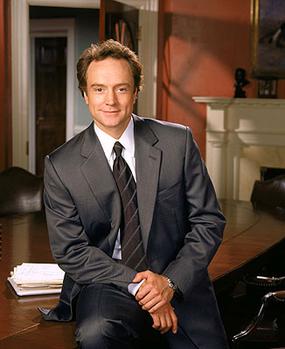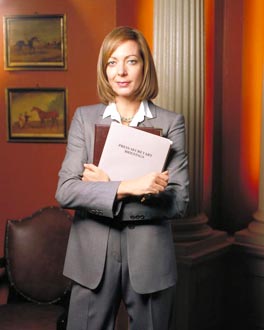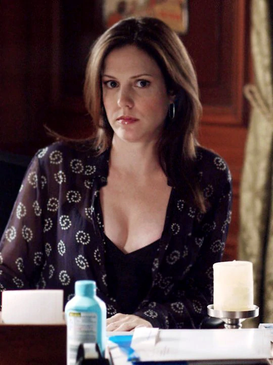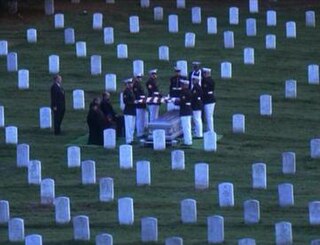Related Research Articles

The West Wing is an American serial political drama television series created by Aaron Sorkin that was originally broadcast on NBC from September 22, 1999, to May 14, 2006. The series is set primarily in the West Wing of the White House, where the Oval Office and offices of presidential senior personnel are located, during the fictitious Democratic administration of President Josiah Bartlet.

Josiah Edward "Jed" Bartlet is a fictional character from the American television serial drama The West Wing created by Aaron Sorkin and portrayed by actor Martin Sheen. The role earned Sheen a Golden Globe Award for Best Actor – Television Series Drama in 2001, as well as two SAG Awards.

Leo Thomas McGarry is a fictional character of the NBC political drama series The West Wing, portrayed by American actor John Spencer.

Joshua Lyman is a fictional character played by Bradley Whitford on the television drama series The West Wing. The role earned Whitford the Primetime Emmy Award for Outstanding Supporting Actor in a Drama Series in 2001. For most of the series, he is White House Deputy Chief of Staff and Chief Political Advisor in the Josiah Bartlet administration.

Tobias "Toby" ZacharyZiegler is a fictional character in the television serial drama The West Wing, played by Richard Schiff. The role of Toby Ziegler earned actor Richard Schiff the Primetime Emmy Award for Outstanding Supporting Actor in a Drama Series in 2000. For most of the series' duration, he is White House Communications Director. In the final season, Ziegler is involved in a storyline around a leak of classified information, which The New York Times compared to the leak investigation of the Valerie Plame affair.

Claudia Jean Cregg is a fictional character played by Allison Janney on the American television drama The West Wing. From the beginning of the series in 1999 until the sixth season in 2004, she was the White House Press Secretary in the administration of President Josiah Bartlet. After that, she serves as the president's chief of staff until the end of the show in 2006. The character is partially inspired by real-life White House Press Secretary Dee Dee Myers, who worked as a consultant on the show.

Charles Young is a fictional character played by Dulé Hill on the television serial drama The West Wing. For the majority of the series, he is the Personal Aide to President Josiah Bartlet.

Amelia Gardner is a fictional character portrayed by Mary-Louise Parker on The West Wing, an American serial political drama. Created in the show's third season after a voicemail from Parker to the show's creator, Amy serves as both a feminist viewpoint on the show and a love interest for Josh Lyman. While critics generally approved of her feminist ideals, they were split on whether her romance with Josh was better or worse than his relationship with his former assistant, Donna Moss.

Mrs. Dolores Landingham, played by Kathryn Joosten and Kirsten Nelson, is the fictional personal secretary for the President of the United States in the first two seasons of American serial political drama The West Wing. She was killed off in the second-season episode "18th and Potomac", but reappeared for multiple flashbacks afterwards. Mrs. Landingham is considered a beloved character whose influence on politicians has continued through to 2021.

Ainsley Hayes is a fictional character played by Emily Procter on The West Wing, an American serial political drama. Primarily appearing in the second and third seasons for a total of twelve episodes, Ainsley served as the Associate White House Counsel under the show's president, Josiah Bartlet. Reception for Ainsley has ranged from mixed to positive; she is characterized as smart and flirtatious, but also vulnerable to sexism from other characters and the show's writing.

"In Excelsis Deo" is the tenth episode of the first season of The West Wing. It originally aired on NBC on December 15, 1999, as the show's Christmas special. Events circle around Toby Ziegler getting involved in the fate of a dead Korean War veteran, reactions to a severe hate crime, and the ongoing controversy surrounding Leo's past alcohol and prescription drug abuse. Written by Aaron Sorkin and Rick Cleveland and directed by Alex Graves, the episode contains guest appearances by Paul Austin and Raynor Scheine. It earned Sorkin and Cleveland the Primetime Emmy Award for Outstanding Writing for a Drama Series, as well as one for Richard Schiff.
"Celestial Navigation" is the fifteenth episode of the first season of the American serial political drama The West Wing. The episode aired on February 16, 2000 on NBC. The episode depicts Josh Lyman narrating a story from the past few days to a collegiate audience, as well as the President's nominee to the Supreme Court being arrested for drunk driving. The episode was widely regarded as lighter and more humorous than other episodes of The West Wing.
"Two Cathedrals" is the 44th episode and second season finale of The West Wing. It was first broadcast on May 16, 2001, on NBC.
"Bartlet for America" is the tenth episode of the third season of American serial political drama The West Wing. The episode aired on December 12, 2001 on NBC. The episode features Leo McGarry, the White House Chief of Staff, testifying before a congressional committee after it is revealed that the administration has been covering up the President's multiple sclerosis. Reception of the episode was mostly positive, and the slogan of "Bartlet for America" has been reprised in popular culture and real-life American politics.
"Hartsfield's Landing" is the fifteenth episode of the third season of The West Wing, an American serial political drama. The episode aired on February 27, 2002, on NBC. The episode takes its title from the fictional bellwether town that is central to the episode, which is holding an election that Josh Lyman wants to win for the president. "Hartsfield's Landing" also includes Toby Ziegler and Sam Seaborn playing chess matches against President Jed Bartlet, and C. J. Cregg involving herself in a prank war against Charlie Young. Allison Janney, who portrayed C. J., described the episode as one of her favorites. In 2020, the episode was reprised by the original cast in A West Wing Special to Benefit When We All Vote.
"Game On" is the sixth episode of the fourth season of The West Wing. The episode aired on October 30, 2002, on NBC. The episode features Josiah Bartlet, the President of the United States, debating against his opponent in the upcoming presidential election, as well as Sam Seaborn meeting the new character of Will Bailey and Leo McGarry attempting to stop the shipment of arms to a terrorist group. Reception for the episode was mixed, with differing viewpoints on how the show portrayed the dueling ideologies of liberalism and conservatism in the United States.
"The Supremes" is the seventeenth episode of the fifth season of American serial political drama television series The West Wing. It originally aired on NBC on March 24, 2004. In "The Supremes", the White House senior staff, under Democratic President Josiah Bartlet, looks to nominate a judge to the Supreme Court of the United States when Josh comes up with a plan to, instead of nominating a centrist to the seat, nominate one liberal and one conservative candidate to two seats on the Court. The episode was met with mixed reception, although it was later noted the show bore similarities to the 2016 death and replacement of real-life Supreme Court Justice Antonin Scalia.
"A Proportional Response" is the third episode of the first season of The West Wing, an American serial television drama. The episode aired on October 6, 1999 on NBC. The episode centers around the continuation of a storyline introduced in the previous episode, in which a plane carrying a new friend of President Bartlet was attacked by the Syrian government. The episode also sees the introduction of Dulé Hill as Charlie Young, and an argument between C. J. Cregg and Sam Seaborn over Sam's decision to befriend a call girl.
"17 People" is the eighteenth episode of the second season of American serial political drama The West Wing. The episode aired on April 4, 2001 on NBC. The episode depicts Josiah Bartlet, the President of the United States, informing his aide Toby Ziegler of startling news about the President's condition, as well as other members of the cast trying to rewrite a humorous speech the President is to give. The episode was generally praised for its intensity, as well as its complexity and stark contrast between plotlines.
References
- 1 2 3 Hudson, Laura (July 16, 2014). "WIRED Summer Binge-Watching Guide: The West Wing". Wired . Retrieved January 2, 2022.
- ↑ Zronik, John Paul (January 15, 2003). "C. J. takes a trip, Modine guest stars on The West Wing". The Edmonton Journal . Retrieved December 31, 2021.
- 1 2 Reale, Hannah (August 31, 2017). "How One Episode of "West Wing" Reveals a Greater Misunderstanding of Alzheimer's". The Wesleyan Argus. Retrieved January 2, 2022.
- 1 2 Heisler, Steve (August 27, 2012). "The West Wing: "The Long Goodbye"". The A.V. Club . Retrieved January 2, 2022.